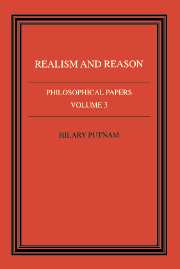Book contents
- Frontmatter
- Contents
- Dedication
- Introduction
- 1 Models and reality
- 2 Equivalence
- 3 Possibility and necessity
- 4 Reference and truth
- 5 ‘Two dogmas’ revisited
- 6 There is at least one a priori truth
- 7 Analyticity and apriority: beyond Wittgenstein and Quine
- 8 Computational psychology and interpretation theory
- 9 Reflections on Goodman's Ways of Worldmaking
- 10 Convention: a theme in philosophy
- 11 Philosophers and human understanding
- 12 Why there isn't a ready-made world
- 13 Why reason can't be naturalized
- 14 Quantum mechanics and the observer
- 15 Vagueness and alternative logic
- 16 Beyond historicism
- Bibliography
- Acknowledgements
- Index
4 - Reference and truth
Published online by Cambridge University Press: 06 January 2010
- Frontmatter
- Contents
- Dedication
- Introduction
- 1 Models and reality
- 2 Equivalence
- 3 Possibility and necessity
- 4 Reference and truth
- 5 ‘Two dogmas’ revisited
- 6 There is at least one a priori truth
- 7 Analyticity and apriority: beyond Wittgenstein and Quine
- 8 Computational psychology and interpretation theory
- 9 Reflections on Goodman's Ways of Worldmaking
- 10 Convention: a theme in philosophy
- 11 Philosophers and human understanding
- 12 Why there isn't a ready-made world
- 13 Why reason can't be naturalized
- 14 Quantum mechanics and the observer
- 15 Vagueness and alternative logic
- 16 Beyond historicism
- Bibliography
- Acknowledgements
- Index
Summary
Russell on reference and truth
According to Bertrand Russell's view in Problems of Philosophy, we have two kinds of knowledge: knowledge by acquaintance and knowledge by description. Knowledge by acquaintance is limited to sense data (for Russell, sense data were themselves qualities, and were thus universals rather than particulars; but the details of his theory are not relevant here). Sense data can be directly apprehended and named according to Russell; only in the case of sense data can we be certain that a name refers and certain of what it refers to. These names – names of sense data of which we have knowledge by acquaintance – Russell called ‘logically proper names’.
Of other sorts of things we have knowledge by description. I can know that there was such a person as Julius Caesar, even though I do not have knowledge by acquaintance of Julius Caesar, because I can describe Julius Caesar as ‘the Roman general who was named “Julius”, who defeated Pompey, who crossed the Rubicon, etc.’ (Of course, these clauses should be reformulated so as to contain only logically proper names: a difficult problem for Russell.)
Russell's view can be restated as a view about the reference of terms as follows.
There are two sorts of terms: basic terms and defined terms.
The defined terms are synonymous with descriptions, i.e., expressions of the form ‘The one and only entity which …’. (Russell's celebrated ‘theory of descriptions’ showed how to translate descriptions into the notation of symbolic logic.)
Basic terms refer to things to which we have some sort of epistemic access.
- Type
- Chapter
- Information
- Philosophical Papers , pp. 69 - 86Publisher: Cambridge University PressPrint publication year: 1983
- 9
- Cited by



